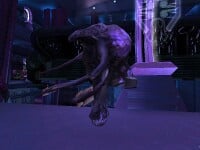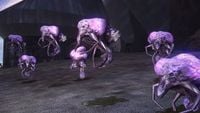Huragok: Difference between revisions
From Halopedia, the Halo wiki
(→Naming) |
(→Naming) |
||
| Line 68: | Line 68: | ||
==Naming== | ==Naming== | ||
The Huragok are named by their parents depending on their initial buoyancy. The parents of the Huragok find the right mix of gases and then give their name on how well they float, for example; [[Lighter than Some]]; Easy to Adjust; | The Huragok are named by their parents depending on their initial buoyancy. The parents of the Huragok find the right mix of gases and then give their name on how well they float, for example; [[Lighter than Some]]; Easy to Adjust; Far too Heavy. | ||
==Trivia== | ==Trivia== | ||
Revision as of 17:21, April 18, 2008
Template:Ratings Template:Covenant Species Infobox
Huragok (Latin Facticius indoles[1], meaning "artificial nature"[2]), known to Humans as Engineers[3], are an artificial race that was created by the Forerunners [4] and the only known non-combatant race of the Covenant.
Summary
While the Prophets guide, direct and manage Forerunner research, it is the Engineer caste who must excavate, unlock and transport Forerunner artifacts. These remarkable aliens are patient, almost completely silent and utterly focused on their task and its religious implications.
Engineers are the scientific engineering backbone of the Covenant and its economy. They float via air sacs and their many tentacles are able to split into many fine cilia, with which they are able to manipulate machinery. Engineers are capable of quickly learning the functionality of new technology. On one occasion an Engineer was observed (by Master Chief) dismantling a vehicle's engine, reassembling it into varying different working configurations, and then reassembling it the way it was, all in a matter of seconds. They are called Huragok in the Forerunner language, and sometimes referred to as 'savants' by the Humans.
Their motivations are unknown, but they appear to draw no distinction between friend and foe, preferring to spend their time inspecting or repairing technology, although they will utter a high pitched keening sound when a Forerunner artifact is under any sort of threat. They are extremely apathetic to any sort of combat, and will just float along with their one desire: to fix things. In one encounter, an Engineer repaired the Master Chief's damaged shield generator and then floated away. This Engineer was later shot due to the risk of it giving the Master Chief's superior shield technology to the Covenant.
Their concentration has been described as "a trance-like reverie" by the few who have witnessed it. They usually communicate only with Prophets (except in the case of Lighter Than Some, a Huragok from the Halo novel Contact Harvest, who communicated with the Unggoy Deacon Dadab via sign language) - a fact that may contribute to the balance of power between Elites and Prophets - and will usually ignore anything that is neither a Prophet nor a Forerunner artifact, although they seem to have a general interest in all machines.[5]
Some Engineers are used to help construct and repair the Covenant starships from the inside, in conjunction with the Drones who construct and repair the ships in space on the outside.
Engineer Anatomy and Physiology
The Engineers are actually not a species at all, but rather an artificial life form created by the Forerunners. However, while they possess no true tissues or organs, their nano-mechanical surrogates so closely mimic their biological analogs that they seem almost indistinguishable to lesser cultures.[6] Their method of locomotion is to float using gas-bladders, even continuing to float when dead. Indeed, if their gas bladders deflate, they will asphyxiate and die. They have six dark eyes and 4 tentacles that can split into very small, near-microscopic cilia. The Engineers use these cilia to construct, repair, or rebuild nearly anything they can grasp. They can take apart whole vehicles and rearrange the entire structure of it in a matter of seconds, and it will still operate. They learn at an unprecedented rate, and store that information for future reference if ever they need to repair the same thing twice. They are capable of surviving in at least Oxygen and Methane-rich environments, but cannot survive in vacuum. Engineers are not a tactical threat and are hardly ever seen in combat situations. They do not regard humans as enemies, and even aided the Master Chief by repairing his shield generator of his MJOLNIR armor in the novel Halo: First Strike. After repairing the Armor, Lieutenant Haverson killed the Engineer, stating that it had learned all about the MJOLNIR technology and could not be allowed to relay said information. Another repaired a broken Needler the Master Chief was using.
The blood coloration of the Engineers looks a deep scarlet orange. Piles of Engineer gore can be seen in the Halo Graphic Novel, whereupon the squad of Elites come across them inside the ship Infinite Succor. The blood also looks highly viscous and sticky. However, it is possible that this is not entirely accurate, as the Graphic Novel took several liberties with appearances.
Though Engineer internal biology is little known, they are capable of using the gas sacks that keep them afloat for anaerobic respiration, using thousands of microscopic organisms to digest the food they consume, producing many gases, including methane, as a by-product[7]. This method is apparently only used as a last resort, and is unpopular among Engineers. Also in Contact Harvest, the Huragok, Lighter Than Some, used anaerobic respiration to keep the Unggoy, Dadab, alive.
Communication
Huragok can communicate with other Covenant species, such as Grunts, and perhaps other Huragok, by flexing their limbs in various directions, bending and overlapping to form the specific formation for each word. Their sacs can also swell and deflate at times of great emotion, suggesting another, more subtle method for communication. Another form of communication is possible, evident in Halo: First Strike, when Cortana uses a Covenant SHIPCOM speakers to verbally communicate with an Engineer via whistle sounds.
Origins
The Engineers were created by the Forerunner prior to the first ring activation[8]. They survived the activation and were collected by the Prophets from various M-Series facilities. Though still sentient creatures, able to reproduce and communicate, Huragok are in truth constructs apparently created using advanced nanotechnology by the Forerunners. They possess no true tissue or organs, but can mimic them so closely they are indistinguishable from their biological analogs. Given sufficient raw materials, a pair of Huragok can produce a unified replica of themselves in approximately 45 minutes. A maximum of three Huragok may participate in the reproduction event, the subsequent time for creation of an offspring is cut down to 30 minutes. The latter method is preferred, because since the new engineer is given all experience possessed by the Engineers partaking in the production of the new engineer, the engineer being produced will receive a wider range of experience.
Appearances
Engineers are seen in Halo: The Fall of Reach, Halo: First Strike, Halo: Ghosts of Onyx and Halo: Contact Harvest.
In Halo: The Fall of Reach, an Engineer is observed by the Master Chief dismantling and re-assembling a human car on Sigma Octanus IV. This was their first recorded appearance by the UNSC.[9]
In the Halo Graphic Novel it is noted that some engineers were stationed on the Infinite Succor. Rtas 'Vadumee noted that the Flood had killed Engineers, smearing their blood onto the floor.
In Halo: First Strike, an Engineer repaired the Master Chief's Needler, then later his Energy Shield and was later shot by Lieutenant Haverson, because it presented the risk of divulging the MJOLNIR's improved shield design to the Covenant. Haverson appeared to feel some pity for the creature. However, in light of information provided by the Bestiarum, it would seem that there is a possibility that it was repaired by another Engineer.
In Halo: Ghost of Onyx, a group of Engineers repaired a NOVA bomb stolen by the Covenant fleet after a Grunt, Kwassass pushed a button. The NOVA bomb was then activated and exploded, destroying the Covenant Supercarrier Sublime Transcendence with its entire crew including Kwassass, as well as the nearby Covenant outpost planet Joyous Exultation and its moon, Malhiem.[10]
Engineers were originally intended to appear in Halo: Combat Evolved, but due to time constraint issues, Engineers were "left on the cutting room floor." But they were not deleted entirely from the software, and modders have since located the Engineer files on the game disc and spawned Engineers in various configurations, hence the images that may be found. Other than this, Covenant Engineers are never seen in any of the games.
Engineers were cut from Halo:CE so late, that in the Prima Guide to Halo:CE, a picture of an Engineer may be seen next to the profile on the Flood Infection Form. Also they can be seen in Halo CE by a mod in the level 343 Guilty Spark. (As seen in photo at left)
Engineers are also featured in the Beastiarium booklet in special editions of Halo 3, though they do not appear in that game either.
A Huragok, Lighter Than Some, appears in the book Halo: Contact Harvest. He is shown to have a fairly friendly relationship with shipmate Dadab, a grunt Deacon.
Naming
The Huragok are named by their parents depending on their initial buoyancy. The parents of the Huragok find the right mix of gases and then give their name on how well they float, for example; Lighter than Some; Easy to Adjust; Far too Heavy.
Trivia
- Facticius means "artificial". Indoles means genius.
- Hurogak are not seen in any of the games without the use of modding.
- Halo fans first learned of the Huragok from a screenshot in the August 2000 issue of PC Gamer magazine (scanned here).
Huragok in Popular Culture
- In the popular fan game, Warthog Launch, Huragoks are the enemies you have to destroy using your warthog.
Sources
- ^ Bestiarum
- ^ HBO Forums
- ^ Halo: Ghosts of Onyx, page 237 - "Huragok: the Forerunner name for the Engineer race".
- ^ Bestiarum
- ^ Halo: The Fall of Reach, pages 200/201
- ^ Bestiarum
- ^ Halo: Contact Harvest
- ^ Bestiarum
- ^ Halo: The Fall of Reach, page 183
- ^ Halo: Ghost of Onyx page 236

